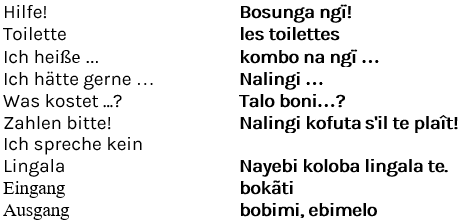Interesting facts about the language
Lingala ist eine afrikanische Verkehrs- und Handelssprache. Sie wird hauptsächlich in den beiden Kongo-Staaten und Angola gesprochen, wo sie den Status einer Nationalsprache hat. Sprachlich gehört sie zu den Bantusprachen, die in Ost- und Zentralafrika sowie im südlichen Afrika gesprochen werden. Entstanden ist Lingala entlang des Kongo-Flusses in der Provinz Equateur. Vorerst war Lingala, ursprünglich Lobangi genannt, die Sprache der Ethnie der Bangala. Im Herzen der von diesen bewohnten Region Ngala, auf halbem Weg zwischen Léopoldville (heute Kinshasa) und Stanleyville, wurde der Hafen Nouvelle Anvers als eine der ersten Handelsstationen des Kongo-Freistaates errichtet. Die drei genannten Posten gehörten zu den ersten im unteren Kongobecken, welche ab 1899 katholische Missionsstationen wurden. Aus Lobangi, vermischt mit weiteren Bantusprachen, entstand im 19. Jahrhundert eine überregionale Verkehrs- und Handelssprache. Aus dem Französischen und aus dem Kiswahili wurden vereinzelt Lehnwörter aufgenommen. Lingala gehört zu den Lusengo-Sprachen und ist sprachlich eng verwandt mit Bangala und Bobangi, wobei etwa ein Drittel des Wortschatzes lexikalische Ähnlichkeit mit letztgenannter Sprache aufweist, aus der es entstanden ist.
Demo version
Learn Lingala for free for two days. Try the course and see for yourself how much faster you can learn Lingala than you ever thought possible. Discover how learning Lingala is finally fun and easy—and how this course truly motivates you to learn every day. You'll be surprised at how much you'll learn in just two days!
Country information
Democratic Republic of Congo
The Democratic Republic of the Congo is a republic in Central Africa. The country borders the Central African Republic, South Sudan, Uganda, Rwanda, Burundi, Tanzania, Zambia, Angola, the Atlantic Ocean, and the Republic of the Congo. The Democratic Republic of the Congo is the second-largest country in Africa by area and the fourth-largest by population. The country is crossed by the equator and has a tropical climate. Large parts of the country's territory are covered by tropical rainforest. The capital, Kinshasa, with over 13 million inhabitants, is the third-largest city in Africa. Cities with over one million inhabitants include Lubumbashi, Mbuji-Mayi, Mbandaka, Kananga, and Kisangani. Despite its wealth of natural resources, the country is one of the poorest countries in the world today due to decades of exploitation, corruption, years of war, and constant population growth.
Benefits of learning the language!
- You will find your way around when you are currently in the Democratic Republic of Congo.
- You broaden your horizons and thereby expand your educational level.
- You improve your career opportunities.
- They contribute to integration.
- They ensure better communication in bilingual relationships.
- This way you get to know a lot of people and can communicate with each other.
What’s special about the language course
- The language course is suitable for beginners.
- Learn a vocabulary of over 450 most important words for communication on vacation.
- Short daily learning time of only 17 minutes a day.
- The daily tasks are given to you and what you have already learned is repeated until it is stored in your long-term memory.
- Learn with different learning methods.
- You don't want to learn alone! Join learning communities and make new connections.
Online Sprachkurs:
- Neueste Version: Die Sprachkurse wurden im Jahr 2020 vollständig überarbeitet.
- Für Windows, Linux, Mac OS, iPhones, Android-Smartphones, IPad und Android-Tablets.
- Über 540.000 Sprachkurse wurden bereits verkauft.
- Software Made in Germany
Die wichtigsten Wörter auf Lingala
Lingala You 1
Lingala You 2
Lingala You 3
Language course variants
Learning German for Congolese people - Express course





